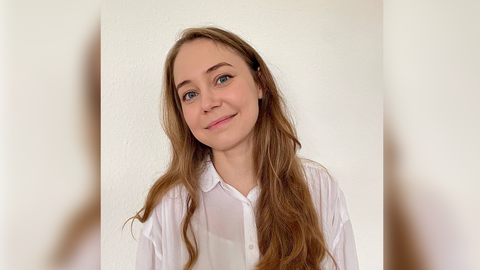Oct 14, 2024
Dr. Alena Pantiukhina: New Researcher at the Institute of Slavic Studies
Alena Pantiukhina is a postdoctoral researcher specializing in Russian literature. Originally from the Tomsk region of Russia, she earned her specialist degree in philology from Tomsk State University (TSU) in 2015. From 2017 to 2019, she taught literature, and from 2019 to 2022, she held positions at TSU, first as an assistant and later as an associate professor. In 2020, she completed her PhD at TSU, focusing on historical narratives in late 20th-century Russian literature. In 2022, Alena had to leave her position at TSU due to her anti-war stance, and subsequently moved to Germany to continue academic work.
Currently, Alena is engaged in the research project "Jewry, Ukraine, and Russia: Friedrich Gorenstein’s Border Narratives," which explores the intersections of Jewish, Russian, and Ukrainian cultures in Gorenstein's work. Her research interests span the construction of historical narratives in literature, Russian-Jewish literature, and post-colonial paradigms within Soviet culture.
Alena’s academic contributions have been acknowledged through fellowships at prominent German institutions, including Freie Universität Berlin, the Leibniz-Institut für Geschichte und Kultur des östlichen Europa, and the Dubnow Institut. She has also received support from the Fedor Stepun Program. Currently, she holds a Philipp Schwartz Fellowship and is a member of the Cologne-Bonn Academy in Exile.
Read more about her research in the following interview:
Name: Dr. Alena Pantiukhina
Position/Professur: Postdoctoral researcher at the Chair of Slavic Literatures (Prof. Klavdia Smola)
Institut/Fakultät: Institute of Slavic Studies at the Faculty of Linguistics, Literature and Cultural Studies
How do you like Dresden?
What I appreciate most about Dresden is that it has become a place where I can truly settle and feel at home. Over the past year, it has provided me with much-needed stability during a turbulent time. I’m drawn to the contrasts of the city, with its multi-layered history and culture that offer vast opportunities for exploration.
When I was 18, I read Kurt Vonnegut’s Slaughterhouse-Five, a novel that left a lasting impression on me, not only because of its literary power but also for its unique perspective. It showed a side of history that wasn’t commonly discussed in Russia. At the heart of that story was Dresden, and the events that unfolded here, and ever since, the image of Dresden from that time has stayed with me. Living here now, I find the city vibrant, with traces of history that deeply resonate with me.
Is it your first time in Germany and Dresden?
I’ve been living in Germany since 2022. Before moving to Dresden, I lived in Berlin and Leipzig. I left Russia in 2022 and it was my first time in Europe at all.
What is your connection to TU Dresden?
With the support of Professor Klavdia Smola from TU Dresden’s Institute of Slavic Studies and the assistance of the university’s international office, I was awarded the Philipp Schwartz Scholarship. This has enabled me to focus on my research project.
What are your main interests as a researcher? Which topics do you focus on?
My main research interest lies in the representation of history in literature, with a particular focus on Russian-language works from the second half of the 20th century. This was also the topic of my PhD dissertation. I believe literature, like other forms of art, can be more powerful and persuasive than historical facts alone. That’s why I’m fascinated by how art reflects and grapples with the "complex past" of Russia and other post-Soviet countries. I'm especially interested in the ways alternative aesthetic and ideological literary practices emerged within the Soviet Union as forms of resistance to the totalitarian state.
What was your most interesting research topic so far?
Right now, I’m focused on Friedrich Gorenstein, and I find this research really exciting. He was a writer of Jewish descent who lived in various cities in Ukraine before moving to Moscow and later to West Berlin. I’m interested in how he embodied multiple roles and cultural identities while staying true to himself.
His work is still not well-researched, yet it has become increasingly relevant in today's discussions about cultural identity. His main archive is located in Bremen at the FSO. And I find it exciting to work in the archive with manuscripts and connect with people who knew Gorenstein personally.
What will be the focus of your research at TU Dresden?
My research project is called "Jewry, Ukraine, and Russia: Friedrich Gorenstein’s Border Narratives". I’m looking at how Jewish, Russian, and Ukrainian cultures connect and clash in Gorenstein's works. I want to understand how these identities are shown in his writing and how they interact within the context of Soviet culture. It’s a way to explore the complexities of cultural identity and how literature reflects historical experiences.
Which item do you absolutely need at your workplace?
I always find a simple notebook and pen essential, even if I work primarily on my laptop. Writing down key ideas helps me organize my thoughts and refine my ideas in a way that typing can’t quite capture.
Do you have a favourite quote? If so, what is it and from whom?
One quote that has really resonated with me comes from the memoirs of Varlam Shalamov. Although I might not quote it exactly, it goes something like this: "The art of living is the art of forgetting." This is not a call to forget but a bittersweet acknowledgment of the imperfections of our human nature. It makes our memories all the more valuable.
Which book did you recently read or which movie/series did you watch recently?
I’m about to finish Midnight’s Children by Salman Rushdie, a classic that blends magical realism with historical narrative. The novel's exploration of cultural identity and the intertwining of personal and national histories resonates with my research interests.
As for movies, the last one that impressed me was the famous film "Plein soleil" starring Alain Delon.
More information about you can be found...
...on my profile on Linkedin: https://www.linkedin.com/in/alena-pantiukhina-1a2887308/

